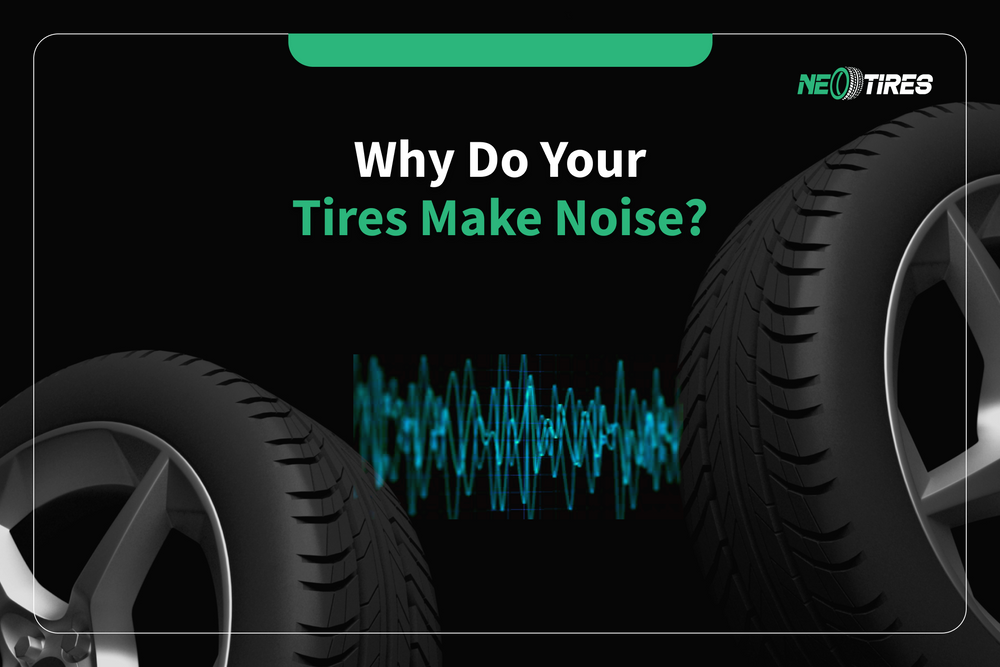Did you know that your tires actually affect the noise you hear in the cabin? You may have guessed this. But how do you realize that the noise is too high or too low? What is the loud noise talking about? What measures can you take to reduce tire noise? These are just some of the questions we will cover in this article.
In general, the noise produced by the tires might be the effect of several factors. It can be influenced by possible tire damage that you may not know about, or even by improper alignment. At the same time, the road you drive on can influence the noise you hear. If the road you are riding on is full of gravel, the rubber wears between the blocks of the tire, generating heat. And the heat increases the pressure inside the tire. This pressure in the tire tries to pull out excessive air through the small gaps in the tires, which also creates sound waves that we hear as noise.
So, it's a real physics of sound, everything about the noise of our tires. We, however, will not go into physics too deeply, but will only shallowly analyze the topic to know how we can influence this noise.
Why Do Tires Make Noise?
If you were lucky enough to ever buy a set of new tires, you surely noticed that they produce less noise than the used ones. The explanation is simple - the new rubber is very elastic and soft following the recent vulcanization process. So, it is very malleable during the drive. Over time, however, the rubber is subject to various impact factors, becoming rigid. Once the stiffness increases, it begins to grind between its smaller and larger blocks, producing noise.
The noise differs between different types of tires. The reason for this difference can be either the tread design or the pressure within the tire.
Can Tire Tread Cause Noise?
If the tire has a severe and aggressive pattern, it will cause a stronger noise. This is because the rubber blocks are larger and generate extra noise when they rub against each other.
Can Tire Pressure Cause Noise?
The tire will produce specific sounds, regardless of whether it has high or low pressure. Tires with insufficient pressure are usually noticed by a flapping sound. In contrast, those inflated too hard do not have a definite sound characteristic. The noise is certainly quite strong, but the sound itself varies a lot every time. So, you better adjust the pressure as the manufacturer recommends.
Different Types of Tires
Tire Purpose
You already know that manufacturers produce various types of tires. They differ not only in diameter, speed, and load ratings but in their noise inhibition properties as well.
As I mentioned before, tires with aggressive architecture will certainly generate more noise. In this context, lovers of experiences with off-road tires cannot enjoy a noise-wise drive. In such circumstances, extreme lovers mainly appreciate the traction, grip, and durability of their off-roaders, at the expense of pretty much noise.
Alternatively, "regular" tires such as summer, winter, and all seasons have a gentler architecture, which significantly reduces noise while driving. For this reason, these tires are associated with comfort and a calmer driving experience.
Tire Design
The modern tire industry puts a lot of emphasis on design. An optimal tire design is not only about aesthetics but also about optimal grip as well. In this context, manufacturers propose 3 types of design that include directional, symmetrical, and asymmetrical patterns.
If you are wondering which is the least noisy, then it is the symmetrical one. A nice bonus of these tires is that they provide a pretty low rolling resistance, as well as a quite silky driving experience.
Contrasting with symmetrical tires, the directional ones produce the most noise of all 3 options. This is because their purpose is to protect the car against hydroplaning and to ensure its stability in unfavorable conditions (mud, snow, rain). Accordingly, reduced noise is not really the number 1 priority of these tires. Though, they are a perfect option for stable control of the car at high speeds.
Asymmetrical tires are somehow a promising compromise in terms of noise, as well as in other aspects such as performance and durability. These tires behave very confidently in wet conditions and provide great curve stability.
Tire Composition
You probably know that tire manufacturers use many other components besides rubber in the tire production process. These components also have an essential role in producing lower or higher tire noise. If the manufacturers opt for more rigid components, they do not really have anti-noise properties. Consequently, they will generate more noise. Alternatively, the "ingredients" that have softening properties inhibit both noises and vibrations. As a result, you enjoy a quieter and more comfortable driving experience.
Does The Road Surface Cause Noise?
If you think that the tires are the only ones that influence the noise, you are wrong. It also depends a lot on the road surface with which the tires interact. Better said, the road roughness impacts the way the tire produces the noise. You probably noticed more noise when you drove on roads full of potholes or those with gravel. The tires are not able to inhibit the noise produced by the gravel. So don't blame your tires too hard, as the noise can be the effect of a bad road surface.
Uneven Tire Wear
Another criterion for the influence of noise is uneven tire wear. By the way, this factor is one of the most common, because car owners do not really draw attention to the fact that their tires are subject to uneven wear.
What does uneven tire wear refer to? This means that your tires wear un-uniformly on their entire surface and also unevenly in relation to each other. There are dozens of causes that lead to uneven tire wear including improper tire pressure, poor maintenance, crazy driving, etc... Regardless of the causes, it is certain that uneven wear impacts tire noise.
Uneven tire wear is often caused by the lack of proper wheel alignment. This misalignment leads to the case when treads interact un-uniformly with the road surface. The consequences of improper wheel alignment include not only increased noise while driving, but also a series of very nasty side effects for the entire suspension system.
Can Bad Suspension Cause Noise?
In the context in which the components of the suspension system are damaged due to natural wear over time, it is not excluded to hear a loud and unpleasant noise in the cabin of your car. You will probably not hear the noise of the components. The idea is that components that have already served their purpose will generate additional stress on the tires. In turn, the tires will be subject to increased friction in relation to the road, and respectively you will have a noisier drive.
Final Thoughts
These are the basic factors that influence noise and its level while driving. It is important to react to it because any foreign noise speaks of potential damage to your vehicle. Do not wait for it to become unbearable to reach a technician. Take immediate action. In order to complete this article as productively as possible, I will also leave here some Q&A to cover aspects that I may have omitted. Here they are.
Noisy Tires: FAQs
Why Are Some Tires Noisier Than Others?
The level of noise produced by your tires depends on a wide set of factors and possible system faults. Some of the criteria include but are not limited to tread patterns, road surface, and types of tires. Other criteria can talk about irregularities in your suspension system and include uneven tire wear, wheel misalignment, or worn suspension components. It is important to contact a technician to rule out a potential system fault.
Which Tires Are The Most Quiet?
In addition to many other influencing criteria, the stiffness as well as the amount of rubber in a tire has a lot to do with the level of noise it will produce. The more flexible the tire, the more it will inhibit vibrations and sound. In the same context, the less aggressive the tire pattern, the less sound it will produce. Check our quietest tires for a refined ride.
What Causes Tire Noise?
Apart from the fact that tire noise depends on factors that we cannot control directly (such as the type of tire, or the road on which we drive), some causes affect the sound due to our lack of care. The most common of these is uneven tire wear. The uneven depths of the tread mean that the tire is not able to inhibit noise qualitatively. In most cases, the noise is produced by one or two tires.
It is crucial to inspect the tire wear regularly as the consequences of uneven wear not only lead to increased noise. Their negative effects involve poor car traction, increased fuel consumption, as well as overall damage to the system.
How Is Tire Noise Different From Wheel Bearing Noise?
It is quite difficult to make the difference between the noise of a faulty tire and that of a faulty wheel bearing. In most cases, they are quite similar. As a general suggestion, you could test the vehicle in the acceleration phase. Once the noise becomes more expressive while you accelerate, the fault probably comes from the wheel bearings.
In contrast, the noise remains at about the same level, regardless of whether you go faster or speed down when it comes to faulty tires. The first aspect that you should check in the case of tire noise is the pressure in it. If the pressure adjustment is not enough, it is probably the consequence of a misalignment.
Are Soundproof Doors and Floors Worth It?
Yes, only if you are sure that the noise in the car is not a consequence of some irregularities. Make sure that the interior condition of your car is in an ideal state. In such circumstances, soundproofing your doors and floors will add comfort to your ride. If you opt for soundproofing without solving the cause of noise generation, the internal system will be impacted even more as soundproofing does not solve the cause of the noise, it only inhibits it.
Best Quiet Tires
Why Trust Us?
We will not try to convince you that we are good at what we do, because you know better which tire dealer suits you the best. But allow us to tell you what we are proud of in the NeoTires team. This will potentially open a door between us and maybe you will consider us whenever you need tire-related assistance.
The NeoTires team is proud of its dedicated members in what they do. Each member has a wide expertise in this field. Our mechanics, testers, and content writers come with a wealth of knowledge accumulated over more than 10 years in everything that means tires, the automotive industry, and road safety. This knowledge helps us to offer high-quality services, assistance, and products to improve the driving experience of our customers.
Last but not least, our main goal is not to sell tires, as you might have thought. On the contrary, we aim to establish a long-term relationship with our clients. In this sense, we focus more on matching the best tires with the individual needs of each driver. And that makes a big difference. Feel free to contact us with any tire-related concerns. Our trained staff is always available to provide helpful and result-oriented assistance. Drive safe and choose your tires wisely!





